The Effect of Trump Administration on U.S. Foreign Policy
VerifiedAdded on 2023/04/21
|9
|3441
|450
AI Summary
This article examines the effect of Trump administration on U.S. foreign policy, focusing on its impact on national security, North Korea, Israel, Iran, Pakistan, Syria, and China. It discusses the changes in foreign policy positions and the handling of various international issues by the administration.
Contribute Materials
Your contribution can guide someone’s learning journey. Share your
documents today.
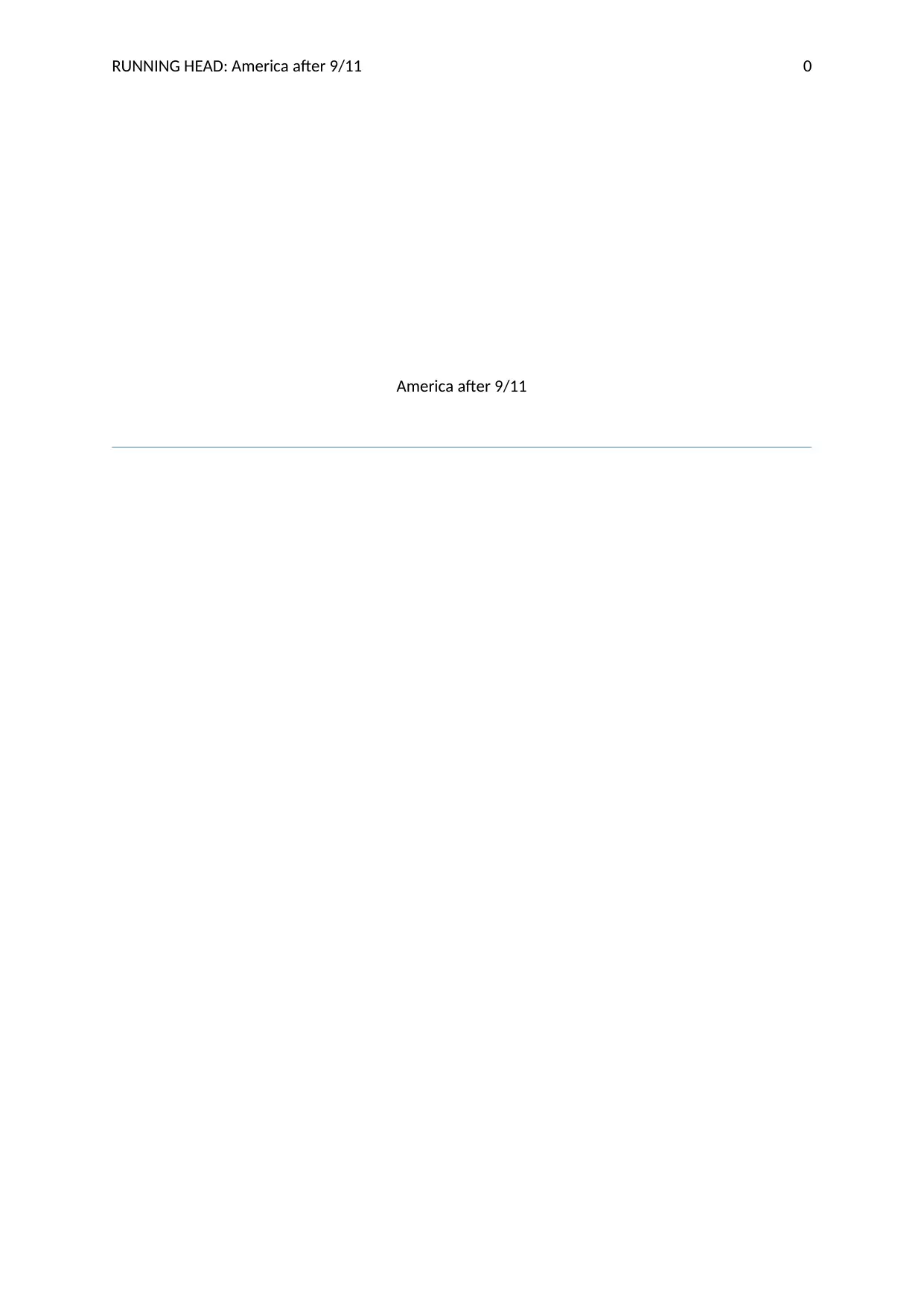
RUNNING HEAD: America after 9/11 0
America after 9/11
America after 9/11
Secure Best Marks with AI Grader
Need help grading? Try our AI Grader for instant feedback on your assignments.
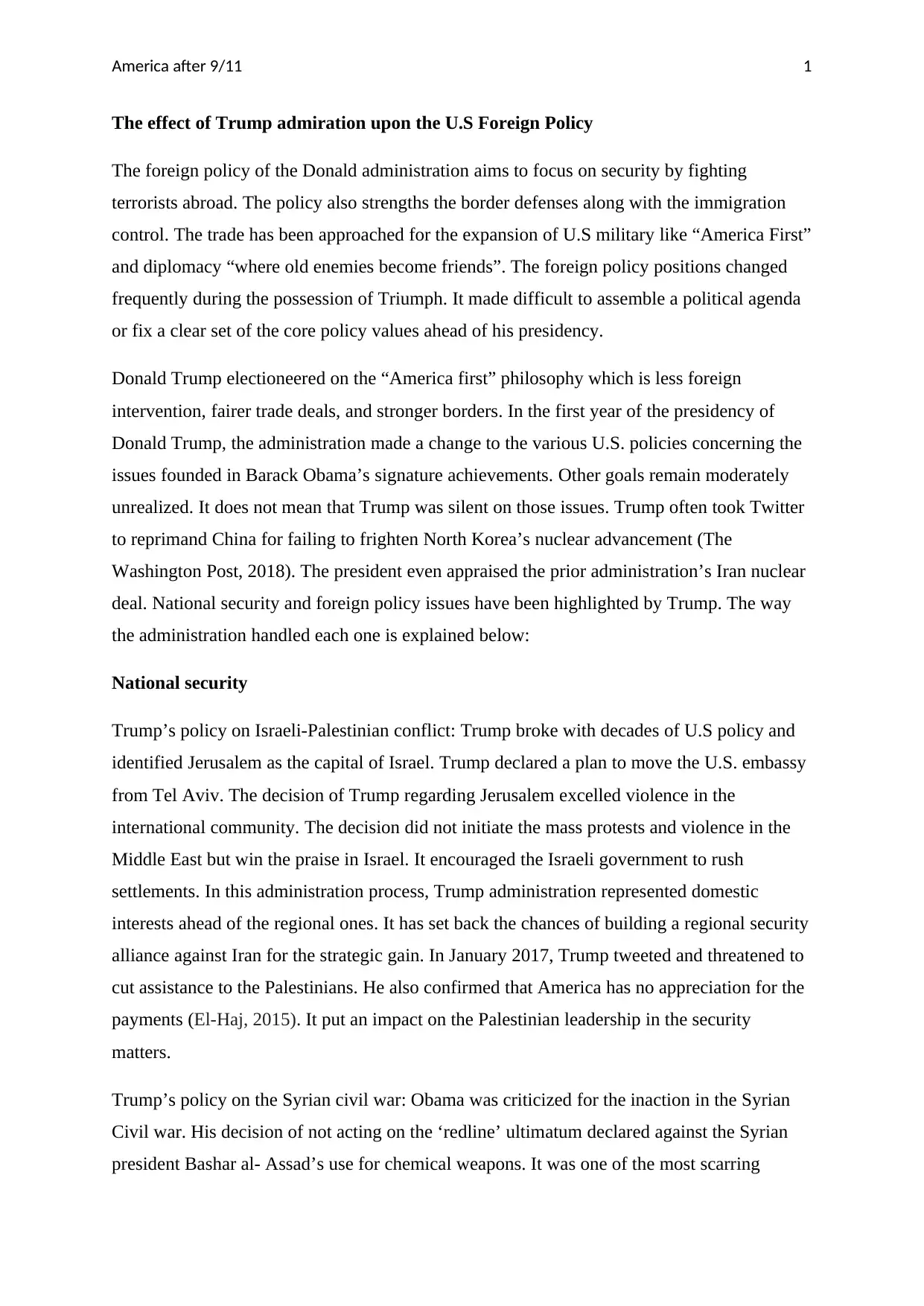
America after 9/11 1
The effect of Trump admiration upon the U.S Foreign Policy
The foreign policy of the Donald administration aims to focus on security by fighting
terrorists abroad. The policy also strengths the border defenses along with the immigration
control. The trade has been approached for the expansion of U.S military like “America First”
and diplomacy “where old enemies become friends”. The foreign policy positions changed
frequently during the possession of Triumph. It made difficult to assemble a political agenda
or fix a clear set of the core policy values ahead of his presidency.
Donald Trump electioneered on the “America first” philosophy which is less foreign
intervention, fairer trade deals, and stronger borders. In the first year of the presidency of
Donald Trump, the administration made a change to the various U.S. policies concerning the
issues founded in Barack Obama’s signature achievements. Other goals remain moderately
unrealized. It does not mean that Trump was silent on those issues. Trump often took Twitter
to reprimand China for failing to frighten North Korea’s nuclear advancement (The
Washington Post, 2018). The president even appraised the prior administration’s Iran nuclear
deal. National security and foreign policy issues have been highlighted by Trump. The way
the administration handled each one is explained below:
National security
Trump’s policy on Israeli-Palestinian conflict: Trump broke with decades of U.S policy and
identified Jerusalem as the capital of Israel. Trump declared a plan to move the U.S. embassy
from Tel Aviv. The decision of Trump regarding Jerusalem excelled violence in the
international community. The decision did not initiate the mass protests and violence in the
Middle East but win the praise in Israel. It encouraged the Israeli government to rush
settlements. In this administration process, Trump administration represented domestic
interests ahead of the regional ones. It has set back the chances of building a regional security
alliance against Iran for the strategic gain. In January 2017, Trump tweeted and threatened to
cut assistance to the Palestinians. He also confirmed that America has no appreciation for the
payments (El-Haj, 2015). It put an impact on the Palestinian leadership in the security
matters.
Trump’s policy on the Syrian civil war: Obama was criticized for the inaction in the Syrian
Civil war. His decision of not acting on the ‘redline’ ultimatum declared against the Syrian
president Bashar al- Assad’s use for chemical weapons. It was one of the most scarring
The effect of Trump admiration upon the U.S Foreign Policy
The foreign policy of the Donald administration aims to focus on security by fighting
terrorists abroad. The policy also strengths the border defenses along with the immigration
control. The trade has been approached for the expansion of U.S military like “America First”
and diplomacy “where old enemies become friends”. The foreign policy positions changed
frequently during the possession of Triumph. It made difficult to assemble a political agenda
or fix a clear set of the core policy values ahead of his presidency.
Donald Trump electioneered on the “America first” philosophy which is less foreign
intervention, fairer trade deals, and stronger borders. In the first year of the presidency of
Donald Trump, the administration made a change to the various U.S. policies concerning the
issues founded in Barack Obama’s signature achievements. Other goals remain moderately
unrealized. It does not mean that Trump was silent on those issues. Trump often took Twitter
to reprimand China for failing to frighten North Korea’s nuclear advancement (The
Washington Post, 2018). The president even appraised the prior administration’s Iran nuclear
deal. National security and foreign policy issues have been highlighted by Trump. The way
the administration handled each one is explained below:
National security
Trump’s policy on Israeli-Palestinian conflict: Trump broke with decades of U.S policy and
identified Jerusalem as the capital of Israel. Trump declared a plan to move the U.S. embassy
from Tel Aviv. The decision of Trump regarding Jerusalem excelled violence in the
international community. The decision did not initiate the mass protests and violence in the
Middle East but win the praise in Israel. It encouraged the Israeli government to rush
settlements. In this administration process, Trump administration represented domestic
interests ahead of the regional ones. It has set back the chances of building a regional security
alliance against Iran for the strategic gain. In January 2017, Trump tweeted and threatened to
cut assistance to the Palestinians. He also confirmed that America has no appreciation for the
payments (El-Haj, 2015). It put an impact on the Palestinian leadership in the security
matters.
Trump’s policy on the Syrian civil war: Obama was criticized for the inaction in the Syrian
Civil war. His decision of not acting on the ‘redline’ ultimatum declared against the Syrian
president Bashar al- Assad’s use for chemical weapons. It was one of the most scarring
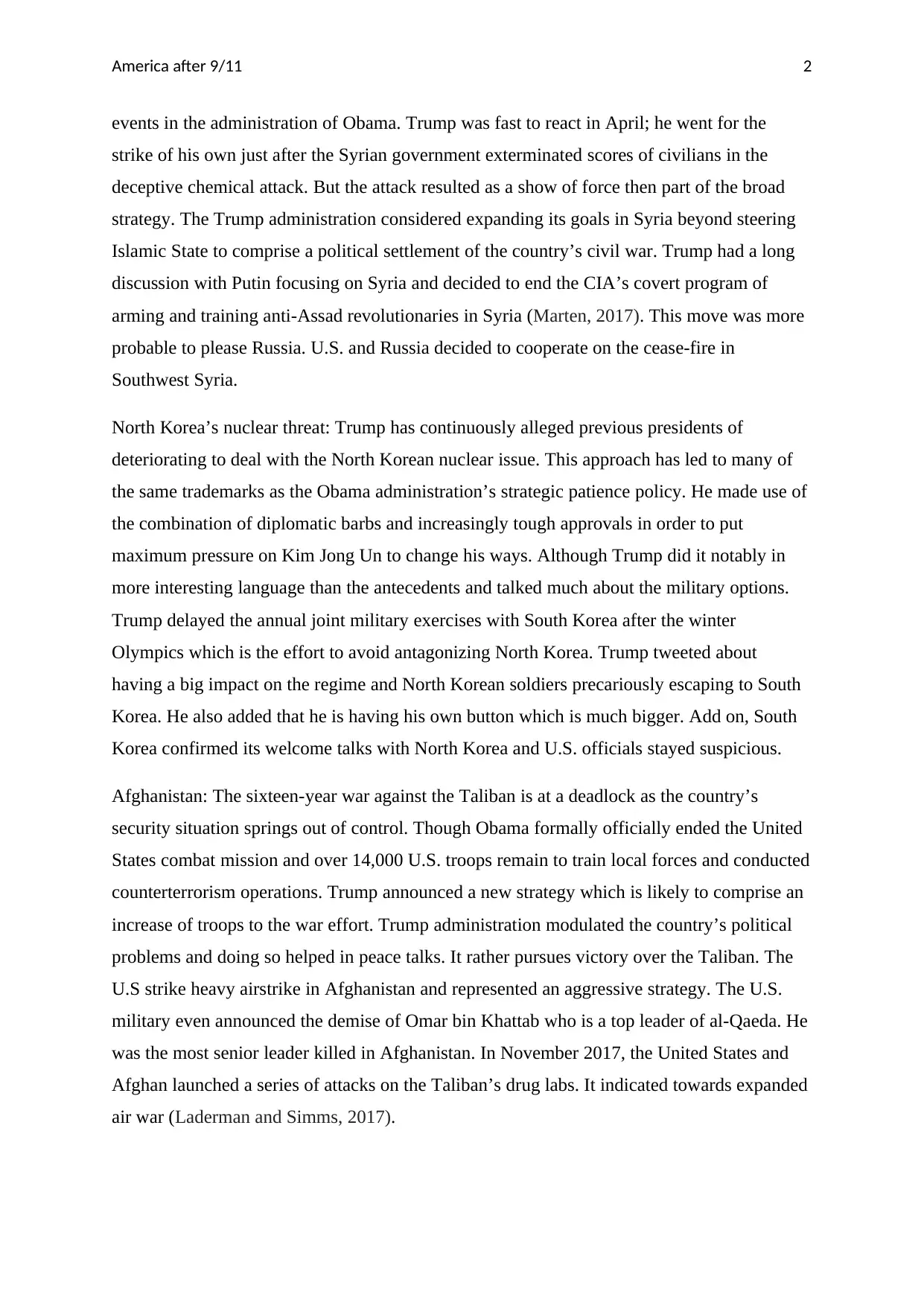
America after 9/11 2
events in the administration of Obama. Trump was fast to react in April; he went for the
strike of his own just after the Syrian government exterminated scores of civilians in the
deceptive chemical attack. But the attack resulted as a show of force then part of the broad
strategy. The Trump administration considered expanding its goals in Syria beyond steering
Islamic State to comprise a political settlement of the country’s civil war. Trump had a long
discussion with Putin focusing on Syria and decided to end the CIA’s covert program of
arming and training anti-Assad revolutionaries in Syria (Marten, 2017). This move was more
probable to please Russia. U.S. and Russia decided to cooperate on the cease-fire in
Southwest Syria.
North Korea’s nuclear threat: Trump has continuously alleged previous presidents of
deteriorating to deal with the North Korean nuclear issue. This approach has led to many of
the same trademarks as the Obama administration’s strategic patience policy. He made use of
the combination of diplomatic barbs and increasingly tough approvals in order to put
maximum pressure on Kim Jong Un to change his ways. Although Trump did it notably in
more interesting language than the antecedents and talked much about the military options.
Trump delayed the annual joint military exercises with South Korea after the winter
Olympics which is the effort to avoid antagonizing North Korea. Trump tweeted about
having a big impact on the regime and North Korean soldiers precariously escaping to South
Korea. He also added that he is having his own button which is much bigger. Add on, South
Korea confirmed its welcome talks with North Korea and U.S. officials stayed suspicious.
Afghanistan: The sixteen-year war against the Taliban is at a deadlock as the country’s
security situation springs out of control. Though Obama formally officially ended the United
States combat mission and over 14,000 U.S. troops remain to train local forces and conducted
counterterrorism operations. Trump announced a new strategy which is likely to comprise an
increase of troops to the war effort. Trump administration modulated the country’s political
problems and doing so helped in peace talks. It rather pursues victory over the Taliban. The
U.S strike heavy airstrike in Afghanistan and represented an aggressive strategy. The U.S.
military even announced the demise of Omar bin Khattab who is a top leader of al-Qaeda. He
was the most senior leader killed in Afghanistan. In November 2017, the United States and
Afghan launched a series of attacks on the Taliban’s drug labs. It indicated towards expanded
air war (Laderman and Simms, 2017).
events in the administration of Obama. Trump was fast to react in April; he went for the
strike of his own just after the Syrian government exterminated scores of civilians in the
deceptive chemical attack. But the attack resulted as a show of force then part of the broad
strategy. The Trump administration considered expanding its goals in Syria beyond steering
Islamic State to comprise a political settlement of the country’s civil war. Trump had a long
discussion with Putin focusing on Syria and decided to end the CIA’s covert program of
arming and training anti-Assad revolutionaries in Syria (Marten, 2017). This move was more
probable to please Russia. U.S. and Russia decided to cooperate on the cease-fire in
Southwest Syria.
North Korea’s nuclear threat: Trump has continuously alleged previous presidents of
deteriorating to deal with the North Korean nuclear issue. This approach has led to many of
the same trademarks as the Obama administration’s strategic patience policy. He made use of
the combination of diplomatic barbs and increasingly tough approvals in order to put
maximum pressure on Kim Jong Un to change his ways. Although Trump did it notably in
more interesting language than the antecedents and talked much about the military options.
Trump delayed the annual joint military exercises with South Korea after the winter
Olympics which is the effort to avoid antagonizing North Korea. Trump tweeted about
having a big impact on the regime and North Korean soldiers precariously escaping to South
Korea. He also added that he is having his own button which is much bigger. Add on, South
Korea confirmed its welcome talks with North Korea and U.S. officials stayed suspicious.
Afghanistan: The sixteen-year war against the Taliban is at a deadlock as the country’s
security situation springs out of control. Though Obama formally officially ended the United
States combat mission and over 14,000 U.S. troops remain to train local forces and conducted
counterterrorism operations. Trump announced a new strategy which is likely to comprise an
increase of troops to the war effort. Trump administration modulated the country’s political
problems and doing so helped in peace talks. It rather pursues victory over the Taliban. The
U.S strike heavy airstrike in Afghanistan and represented an aggressive strategy. The U.S.
military even announced the demise of Omar bin Khattab who is a top leader of al-Qaeda. He
was the most senior leader killed in Afghanistan. In November 2017, the United States and
Afghan launched a series of attacks on the Taliban’s drug labs. It indicated towards expanded
air war (Laderman and Simms, 2017).
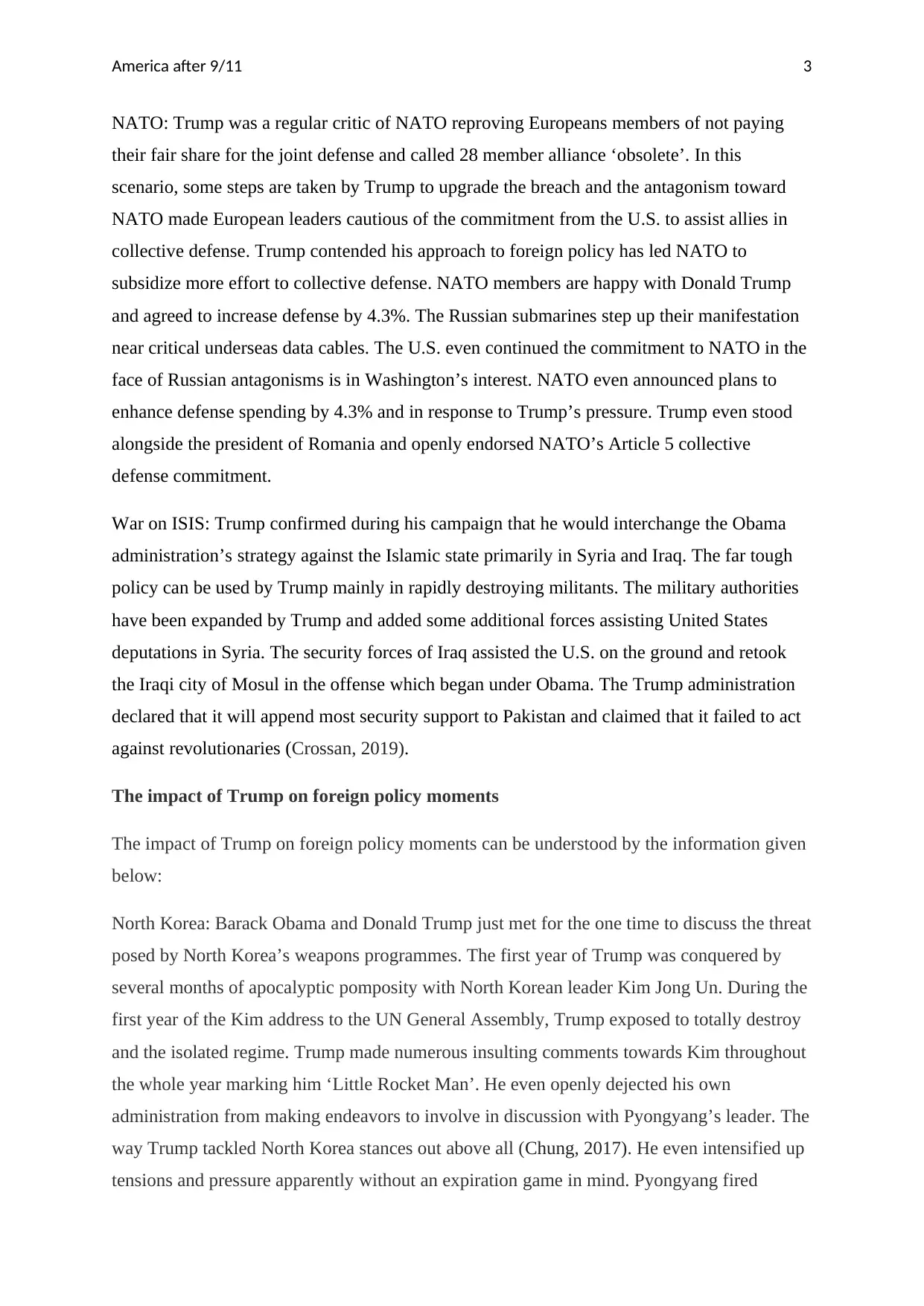
America after 9/11 3
NATO: Trump was a regular critic of NATO reproving Europeans members of not paying
their fair share for the joint defense and called 28 member alliance ‘obsolete’. In this
scenario, some steps are taken by Trump to upgrade the breach and the antagonism toward
NATO made European leaders cautious of the commitment from the U.S. to assist allies in
collective defense. Trump contended his approach to foreign policy has led NATO to
subsidize more effort to collective defense. NATO members are happy with Donald Trump
and agreed to increase defense by 4.3%. The Russian submarines step up their manifestation
near critical underseas data cables. The U.S. even continued the commitment to NATO in the
face of Russian antagonisms is in Washington’s interest. NATO even announced plans to
enhance defense spending by 4.3% and in response to Trump’s pressure. Trump even stood
alongside the president of Romania and openly endorsed NATO’s Article 5 collective
defense commitment.
War on ISIS: Trump confirmed during his campaign that he would interchange the Obama
administration’s strategy against the Islamic state primarily in Syria and Iraq. The far tough
policy can be used by Trump mainly in rapidly destroying militants. The military authorities
have been expanded by Trump and added some additional forces assisting United States
deputations in Syria. The security forces of Iraq assisted the U.S. on the ground and retook
the Iraqi city of Mosul in the offense which began under Obama. The Trump administration
declared that it will append most security support to Pakistan and claimed that it failed to act
against revolutionaries (Crossan, 2019).
The impact of Trump on foreign policy moments
The impact of Trump on foreign policy moments can be understood by the information given
below:
North Korea: Barack Obama and Donald Trump just met for the one time to discuss the threat
posed by North Korea’s weapons programmes. The first year of Trump was conquered by
several months of apocalyptic pomposity with North Korean leader Kim Jong Un. During the
first year of the Kim address to the UN General Assembly, Trump exposed to totally destroy
and the isolated regime. Trump made numerous insulting comments towards Kim throughout
the whole year marking him ‘Little Rocket Man’. He even openly dejected his own
administration from making endeavors to involve in discussion with Pyongyang’s leader. The
way Trump tackled North Korea stances out above all (Chung, 2017). He even intensified up
tensions and pressure apparently without an expiration game in mind. Pyongyang fired
NATO: Trump was a regular critic of NATO reproving Europeans members of not paying
their fair share for the joint defense and called 28 member alliance ‘obsolete’. In this
scenario, some steps are taken by Trump to upgrade the breach and the antagonism toward
NATO made European leaders cautious of the commitment from the U.S. to assist allies in
collective defense. Trump contended his approach to foreign policy has led NATO to
subsidize more effort to collective defense. NATO members are happy with Donald Trump
and agreed to increase defense by 4.3%. The Russian submarines step up their manifestation
near critical underseas data cables. The U.S. even continued the commitment to NATO in the
face of Russian antagonisms is in Washington’s interest. NATO even announced plans to
enhance defense spending by 4.3% and in response to Trump’s pressure. Trump even stood
alongside the president of Romania and openly endorsed NATO’s Article 5 collective
defense commitment.
War on ISIS: Trump confirmed during his campaign that he would interchange the Obama
administration’s strategy against the Islamic state primarily in Syria and Iraq. The far tough
policy can be used by Trump mainly in rapidly destroying militants. The military authorities
have been expanded by Trump and added some additional forces assisting United States
deputations in Syria. The security forces of Iraq assisted the U.S. on the ground and retook
the Iraqi city of Mosul in the offense which began under Obama. The Trump administration
declared that it will append most security support to Pakistan and claimed that it failed to act
against revolutionaries (Crossan, 2019).
The impact of Trump on foreign policy moments
The impact of Trump on foreign policy moments can be understood by the information given
below:
North Korea: Barack Obama and Donald Trump just met for the one time to discuss the threat
posed by North Korea’s weapons programmes. The first year of Trump was conquered by
several months of apocalyptic pomposity with North Korean leader Kim Jong Un. During the
first year of the Kim address to the UN General Assembly, Trump exposed to totally destroy
and the isolated regime. Trump made numerous insulting comments towards Kim throughout
the whole year marking him ‘Little Rocket Man’. He even openly dejected his own
administration from making endeavors to involve in discussion with Pyongyang’s leader. The
way Trump tackled North Korea stances out above all (Chung, 2017). He even intensified up
tensions and pressure apparently without an expiration game in mind. Pyongyang fired
Secure Best Marks with AI Grader
Need help grading? Try our AI Grader for instant feedback on your assignments.
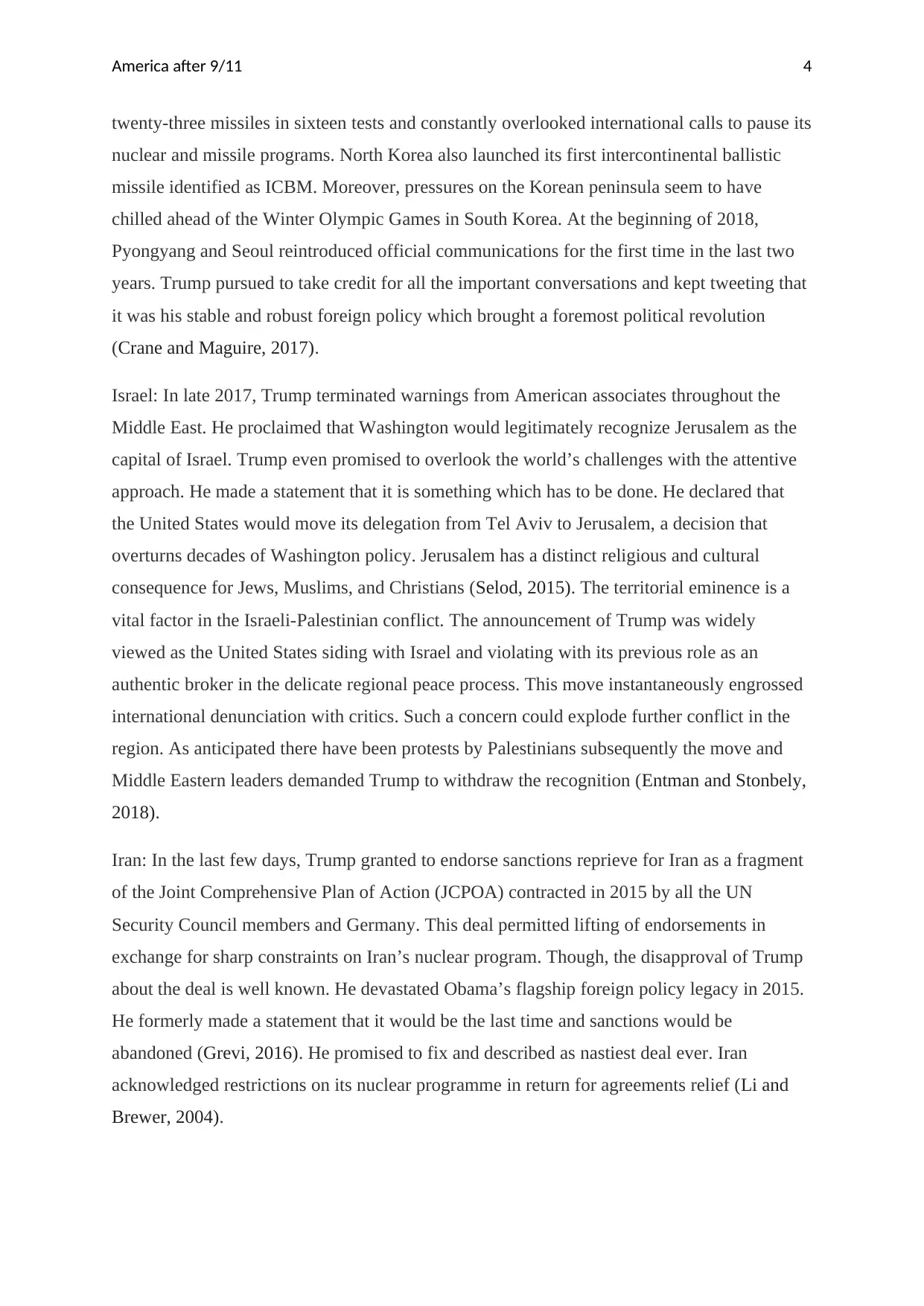
America after 9/11 4
twenty-three missiles in sixteen tests and constantly overlooked international calls to pause its
nuclear and missile programs. North Korea also launched its first intercontinental ballistic
missile identified as ICBM. Moreover, pressures on the Korean peninsula seem to have
chilled ahead of the Winter Olympic Games in South Korea. At the beginning of 2018,
Pyongyang and Seoul reintroduced official communications for the first time in the last two
years. Trump pursued to take credit for all the important conversations and kept tweeting that
it was his stable and robust foreign policy which brought a foremost political revolution
(Crane and Maguire, 2017).
Israel: In late 2017, Trump terminated warnings from American associates throughout the
Middle East. He proclaimed that Washington would legitimately recognize Jerusalem as the
capital of Israel. Trump even promised to overlook the world’s challenges with the attentive
approach. He made a statement that it is something which has to be done. He declared that
the United States would move its delegation from Tel Aviv to Jerusalem, a decision that
overturns decades of Washington policy. Jerusalem has a distinct religious and cultural
consequence for Jews, Muslims, and Christians (Selod, 2015). The territorial eminence is a
vital factor in the Israeli-Palestinian conflict. The announcement of Trump was widely
viewed as the United States siding with Israel and violating with its previous role as an
authentic broker in the delicate regional peace process. This move instantaneously engrossed
international denunciation with critics. Such a concern could explode further conflict in the
region. As anticipated there have been protests by Palestinians subsequently the move and
Middle Eastern leaders demanded Trump to withdraw the recognition (Entman and Stonbely,
2018).
Iran: In the last few days, Trump granted to endorse sanctions reprieve for Iran as a fragment
of the Joint Comprehensive Plan of Action (JCPOA) contracted in 2015 by all the UN
Security Council members and Germany. This deal permitted lifting of endorsements in
exchange for sharp constraints on Iran’s nuclear program. Though, the disapproval of Trump
about the deal is well known. He devastated Obama’s flagship foreign policy legacy in 2015.
He formerly made a statement that it would be the last time and sanctions would be
abandoned (Grevi, 2016). He promised to fix and described as nastiest deal ever. Iran
acknowledged restrictions on its nuclear programme in return for agreements relief (Li and
Brewer, 2004).
twenty-three missiles in sixteen tests and constantly overlooked international calls to pause its
nuclear and missile programs. North Korea also launched its first intercontinental ballistic
missile identified as ICBM. Moreover, pressures on the Korean peninsula seem to have
chilled ahead of the Winter Olympic Games in South Korea. At the beginning of 2018,
Pyongyang and Seoul reintroduced official communications for the first time in the last two
years. Trump pursued to take credit for all the important conversations and kept tweeting that
it was his stable and robust foreign policy which brought a foremost political revolution
(Crane and Maguire, 2017).
Israel: In late 2017, Trump terminated warnings from American associates throughout the
Middle East. He proclaimed that Washington would legitimately recognize Jerusalem as the
capital of Israel. Trump even promised to overlook the world’s challenges with the attentive
approach. He made a statement that it is something which has to be done. He declared that
the United States would move its delegation from Tel Aviv to Jerusalem, a decision that
overturns decades of Washington policy. Jerusalem has a distinct religious and cultural
consequence for Jews, Muslims, and Christians (Selod, 2015). The territorial eminence is a
vital factor in the Israeli-Palestinian conflict. The announcement of Trump was widely
viewed as the United States siding with Israel and violating with its previous role as an
authentic broker in the delicate regional peace process. This move instantaneously engrossed
international denunciation with critics. Such a concern could explode further conflict in the
region. As anticipated there have been protests by Palestinians subsequently the move and
Middle Eastern leaders demanded Trump to withdraw the recognition (Entman and Stonbely,
2018).
Iran: In the last few days, Trump granted to endorse sanctions reprieve for Iran as a fragment
of the Joint Comprehensive Plan of Action (JCPOA) contracted in 2015 by all the UN
Security Council members and Germany. This deal permitted lifting of endorsements in
exchange for sharp constraints on Iran’s nuclear program. Though, the disapproval of Trump
about the deal is well known. He devastated Obama’s flagship foreign policy legacy in 2015.
He formerly made a statement that it would be the last time and sanctions would be
abandoned (Grevi, 2016). He promised to fix and described as nastiest deal ever. Iran
acknowledged restrictions on its nuclear programme in return for agreements relief (Li and
Brewer, 2004).
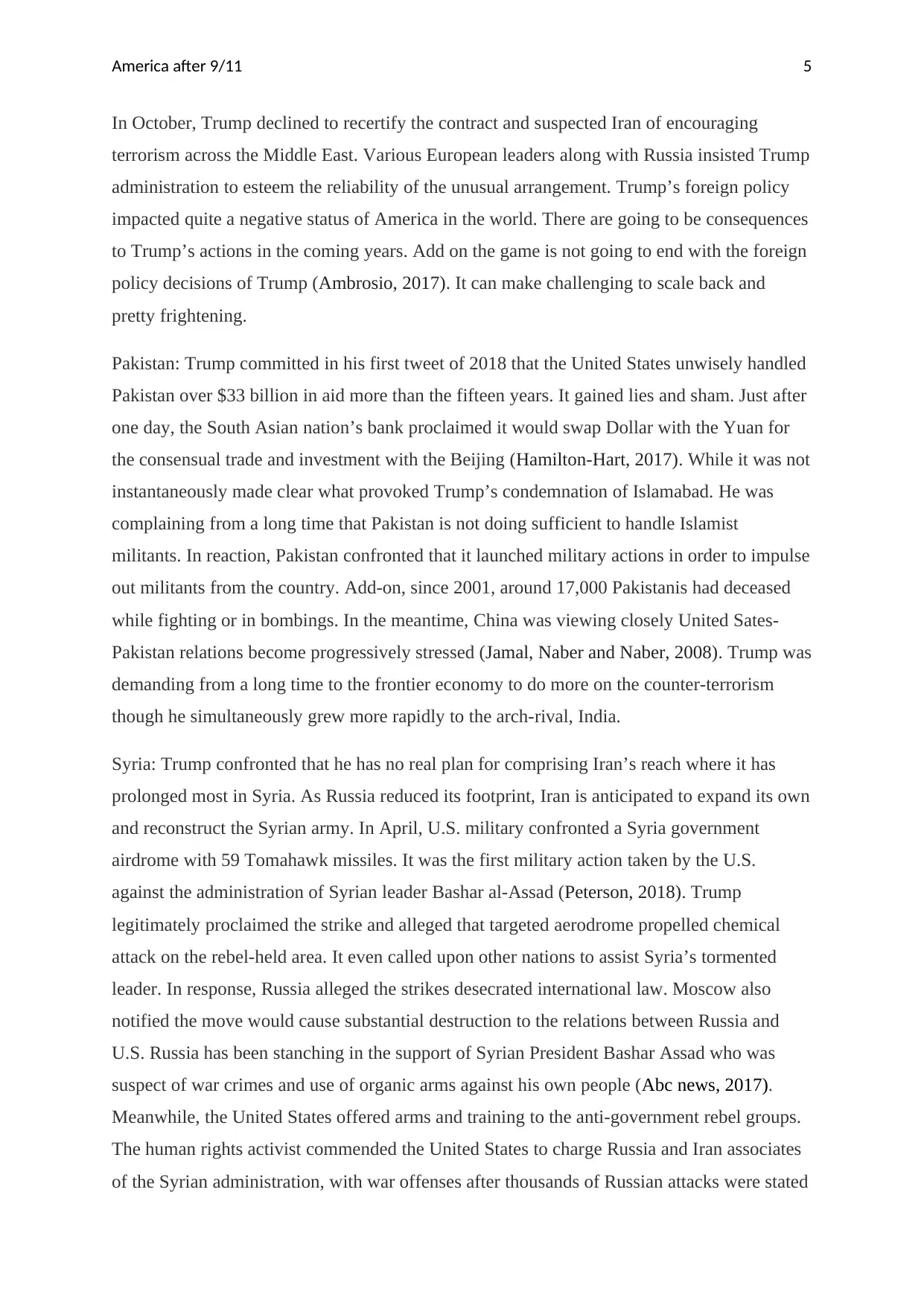
America after 9/11 5
In October, Trump declined to recertify the contract and suspected Iran of encouraging
terrorism across the Middle East. Various European leaders along with Russia insisted Trump
administration to esteem the reliability of the unusual arrangement. Trump’s foreign policy
impacted quite a negative status of America in the world. There are going to be consequences
to Trump’s actions in the coming years. Add on the game is not going to end with the foreign
policy decisions of Trump (Ambrosio, 2017). It can make challenging to scale back and
pretty frightening.
Pakistan: Trump committed in his first tweet of 2018 that the United States unwisely handled
Pakistan over $33 billion in aid more than the fifteen years. It gained lies and sham. Just after
one day, the South Asian nation’s bank proclaimed it would swap Dollar with the Yuan for
the consensual trade and investment with the Beijing (Hamilton-Hart, 2017). While it was not
instantaneously made clear what provoked Trump’s condemnation of Islamabad. He was
complaining from a long time that Pakistan is not doing sufficient to handle Islamist
militants. In reaction, Pakistan confronted that it launched military actions in order to impulse
out militants from the country. Add-on, since 2001, around 17,000 Pakistanis had deceased
while fighting or in bombings. In the meantime, China was viewing closely United Sates-
Pakistan relations become progressively stressed (Jamal, Naber and Naber, 2008). Trump was
demanding from a long time to the frontier economy to do more on the counter-terrorism
though he simultaneously grew more rapidly to the arch-rival, India.
Syria: Trump confronted that he has no real plan for comprising Iran’s reach where it has
prolonged most in Syria. As Russia reduced its footprint, Iran is anticipated to expand its own
and reconstruct the Syrian army. In April, U.S. military confronted a Syria government
airdrome with 59 Tomahawk missiles. It was the first military action taken by the U.S.
against the administration of Syrian leader Bashar al-Assad (Peterson, 2018). Trump
legitimately proclaimed the strike and alleged that targeted aerodrome propelled chemical
attack on the rebel-held area. It even called upon other nations to assist Syria’s tormented
leader. In response, Russia alleged the strikes desecrated international law. Moscow also
notified the move would cause substantial destruction to the relations between Russia and
U.S. Russia has been stanching in the support of Syrian President Bashar Assad who was
suspect of war crimes and use of organic arms against his own people (Abc news, 2017).
Meanwhile, the United States offered arms and training to the anti-government rebel groups.
The human rights activist commended the United States to charge Russia and Iran associates
of the Syrian administration, with war offenses after thousands of Russian attacks were stated
In October, Trump declined to recertify the contract and suspected Iran of encouraging
terrorism across the Middle East. Various European leaders along with Russia insisted Trump
administration to esteem the reliability of the unusual arrangement. Trump’s foreign policy
impacted quite a negative status of America in the world. There are going to be consequences
to Trump’s actions in the coming years. Add on the game is not going to end with the foreign
policy decisions of Trump (Ambrosio, 2017). It can make challenging to scale back and
pretty frightening.
Pakistan: Trump committed in his first tweet of 2018 that the United States unwisely handled
Pakistan over $33 billion in aid more than the fifteen years. It gained lies and sham. Just after
one day, the South Asian nation’s bank proclaimed it would swap Dollar with the Yuan for
the consensual trade and investment with the Beijing (Hamilton-Hart, 2017). While it was not
instantaneously made clear what provoked Trump’s condemnation of Islamabad. He was
complaining from a long time that Pakistan is not doing sufficient to handle Islamist
militants. In reaction, Pakistan confronted that it launched military actions in order to impulse
out militants from the country. Add-on, since 2001, around 17,000 Pakistanis had deceased
while fighting or in bombings. In the meantime, China was viewing closely United Sates-
Pakistan relations become progressively stressed (Jamal, Naber and Naber, 2008). Trump was
demanding from a long time to the frontier economy to do more on the counter-terrorism
though he simultaneously grew more rapidly to the arch-rival, India.
Syria: Trump confronted that he has no real plan for comprising Iran’s reach where it has
prolonged most in Syria. As Russia reduced its footprint, Iran is anticipated to expand its own
and reconstruct the Syrian army. In April, U.S. military confronted a Syria government
airdrome with 59 Tomahawk missiles. It was the first military action taken by the U.S.
against the administration of Syrian leader Bashar al-Assad (Peterson, 2018). Trump
legitimately proclaimed the strike and alleged that targeted aerodrome propelled chemical
attack on the rebel-held area. It even called upon other nations to assist Syria’s tormented
leader. In response, Russia alleged the strikes desecrated international law. Moscow also
notified the move would cause substantial destruction to the relations between Russia and
U.S. Russia has been stanching in the support of Syrian President Bashar Assad who was
suspect of war crimes and use of organic arms against his own people (Abc news, 2017).
Meanwhile, the United States offered arms and training to the anti-government rebel groups.
The human rights activist commended the United States to charge Russia and Iran associates
of the Syrian administration, with war offenses after thousands of Russian attacks were stated
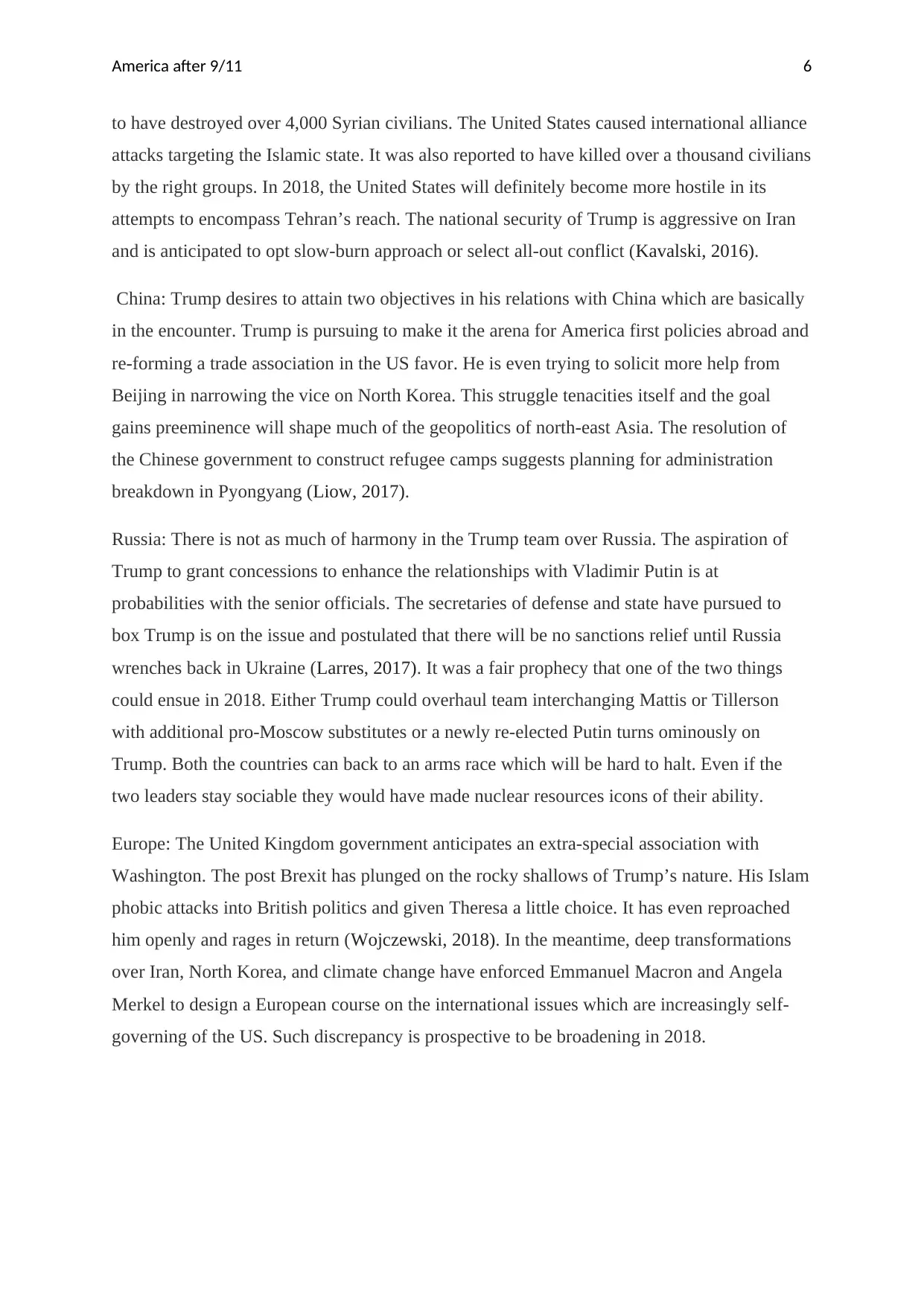
America after 9/11 6
to have destroyed over 4,000 Syrian civilians. The United States caused international alliance
attacks targeting the Islamic state. It was also reported to have killed over a thousand civilians
by the right groups. In 2018, the United States will definitely become more hostile in its
attempts to encompass Tehran’s reach. The national security of Trump is aggressive on Iran
and is anticipated to opt slow-burn approach or select all-out conflict (Kavalski, 2016).
China: Trump desires to attain two objectives in his relations with China which are basically
in the encounter. Trump is pursuing to make it the arena for America first policies abroad and
re-forming a trade association in the US favor. He is even trying to solicit more help from
Beijing in narrowing the vice on North Korea. This struggle tenacities itself and the goal
gains preeminence will shape much of the geopolitics of north-east Asia. The resolution of
the Chinese government to construct refugee camps suggests planning for administration
breakdown in Pyongyang (Liow, 2017).
Russia: There is not as much of harmony in the Trump team over Russia. The aspiration of
Trump to grant concessions to enhance the relationships with Vladimir Putin is at
probabilities with the senior officials. The secretaries of defense and state have pursued to
box Trump is on the issue and postulated that there will be no sanctions relief until Russia
wrenches back in Ukraine (Larres, 2017). It was a fair prophecy that one of the two things
could ensue in 2018. Either Trump could overhaul team interchanging Mattis or Tillerson
with additional pro-Moscow substitutes or a newly re-elected Putin turns ominously on
Trump. Both the countries can back to an arms race which will be hard to halt. Even if the
two leaders stay sociable they would have made nuclear resources icons of their ability.
Europe: The United Kingdom government anticipates an extra-special association with
Washington. The post Brexit has plunged on the rocky shallows of Trump’s nature. His Islam
phobic attacks into British politics and given Theresa a little choice. It has even reproached
him openly and rages in return (Wojczewski, 2018). In the meantime, deep transformations
over Iran, North Korea, and climate change have enforced Emmanuel Macron and Angela
Merkel to design a European course on the international issues which are increasingly self-
governing of the US. Such discrepancy is prospective to be broadening in 2018.
to have destroyed over 4,000 Syrian civilians. The United States caused international alliance
attacks targeting the Islamic state. It was also reported to have killed over a thousand civilians
by the right groups. In 2018, the United States will definitely become more hostile in its
attempts to encompass Tehran’s reach. The national security of Trump is aggressive on Iran
and is anticipated to opt slow-burn approach or select all-out conflict (Kavalski, 2016).
China: Trump desires to attain two objectives in his relations with China which are basically
in the encounter. Trump is pursuing to make it the arena for America first policies abroad and
re-forming a trade association in the US favor. He is even trying to solicit more help from
Beijing in narrowing the vice on North Korea. This struggle tenacities itself and the goal
gains preeminence will shape much of the geopolitics of north-east Asia. The resolution of
the Chinese government to construct refugee camps suggests planning for administration
breakdown in Pyongyang (Liow, 2017).
Russia: There is not as much of harmony in the Trump team over Russia. The aspiration of
Trump to grant concessions to enhance the relationships with Vladimir Putin is at
probabilities with the senior officials. The secretaries of defense and state have pursued to
box Trump is on the issue and postulated that there will be no sanctions relief until Russia
wrenches back in Ukraine (Larres, 2017). It was a fair prophecy that one of the two things
could ensue in 2018. Either Trump could overhaul team interchanging Mattis or Tillerson
with additional pro-Moscow substitutes or a newly re-elected Putin turns ominously on
Trump. Both the countries can back to an arms race which will be hard to halt. Even if the
two leaders stay sociable they would have made nuclear resources icons of their ability.
Europe: The United Kingdom government anticipates an extra-special association with
Washington. The post Brexit has plunged on the rocky shallows of Trump’s nature. His Islam
phobic attacks into British politics and given Theresa a little choice. It has even reproached
him openly and rages in return (Wojczewski, 2018). In the meantime, deep transformations
over Iran, North Korea, and climate change have enforced Emmanuel Macron and Angela
Merkel to design a European course on the international issues which are increasingly self-
governing of the US. Such discrepancy is prospective to be broadening in 2018.
Paraphrase This Document
Need a fresh take? Get an instant paraphrase of this document with our AI Paraphraser
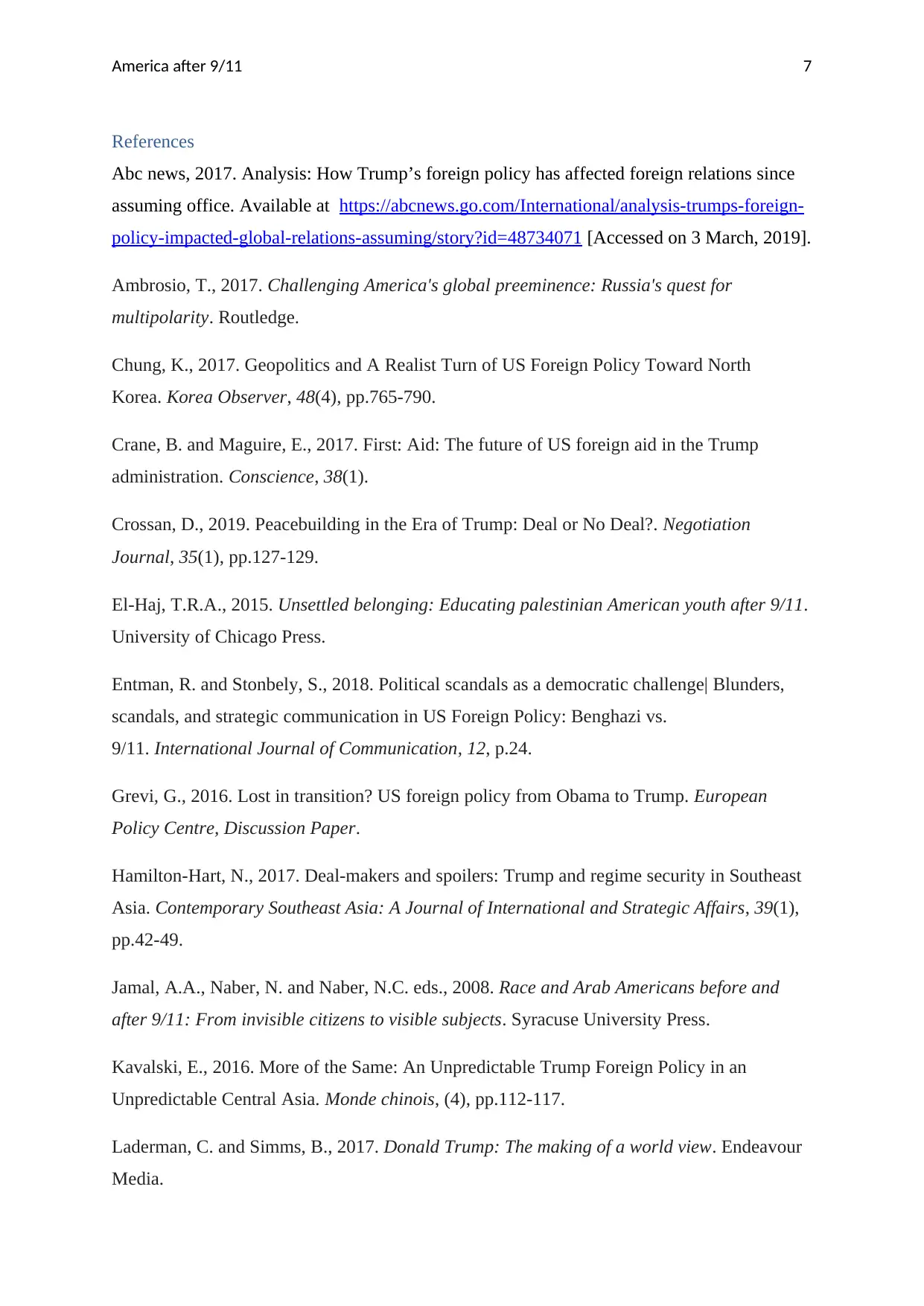
America after 9/11 7
References
Abc news, 2017. Analysis: How Trump’s foreign policy has affected foreign relations since
assuming office. Available at https://abcnews.go.com/International/analysis-trumps-foreign-
policy-impacted-global-relations-assuming/story?id=48734071 [Accessed on 3 March, 2019].
Ambrosio, T., 2017. Challenging America's global preeminence: Russia's quest for
multipolarity. Routledge.
Chung, K., 2017. Geopolitics and A Realist Turn of US Foreign Policy Toward North
Korea. Korea Observer, 48(4), pp.765-790.
Crane, B. and Maguire, E., 2017. First: Aid: The future of US foreign aid in the Trump
administration. Conscience, 38(1).
Crossan, D., 2019. Peacebuilding in the Era of Trump: Deal or No Deal?. Negotiation
Journal, 35(1), pp.127-129.
El-Haj, T.R.A., 2015. Unsettled belonging: Educating palestinian American youth after 9/11.
University of Chicago Press.
Entman, R. and Stonbely, S., 2018. Political scandals as a democratic challenge| Blunders,
scandals, and strategic communication in US Foreign Policy: Benghazi vs.
9/11. International Journal of Communication, 12, p.24.
Grevi, G., 2016. Lost in transition? US foreign policy from Obama to Trump. European
Policy Centre, Discussion Paper.
Hamilton-Hart, N., 2017. Deal-makers and spoilers: Trump and regime security in Southeast
Asia. Contemporary Southeast Asia: A Journal of International and Strategic Affairs, 39(1),
pp.42-49.
Jamal, A.A., Naber, N. and Naber, N.C. eds., 2008. Race and Arab Americans before and
after 9/11: From invisible citizens to visible subjects. Syracuse University Press.
Kavalski, E., 2016. More of the Same: An Unpredictable Trump Foreign Policy in an
Unpredictable Central Asia. Monde chinois, (4), pp.112-117.
Laderman, C. and Simms, B., 2017. Donald Trump: The making of a world view. Endeavour
Media.
References
Abc news, 2017. Analysis: How Trump’s foreign policy has affected foreign relations since
assuming office. Available at https://abcnews.go.com/International/analysis-trumps-foreign-
policy-impacted-global-relations-assuming/story?id=48734071 [Accessed on 3 March, 2019].
Ambrosio, T., 2017. Challenging America's global preeminence: Russia's quest for
multipolarity. Routledge.
Chung, K., 2017. Geopolitics and A Realist Turn of US Foreign Policy Toward North
Korea. Korea Observer, 48(4), pp.765-790.
Crane, B. and Maguire, E., 2017. First: Aid: The future of US foreign aid in the Trump
administration. Conscience, 38(1).
Crossan, D., 2019. Peacebuilding in the Era of Trump: Deal or No Deal?. Negotiation
Journal, 35(1), pp.127-129.
El-Haj, T.R.A., 2015. Unsettled belonging: Educating palestinian American youth after 9/11.
University of Chicago Press.
Entman, R. and Stonbely, S., 2018. Political scandals as a democratic challenge| Blunders,
scandals, and strategic communication in US Foreign Policy: Benghazi vs.
9/11. International Journal of Communication, 12, p.24.
Grevi, G., 2016. Lost in transition? US foreign policy from Obama to Trump. European
Policy Centre, Discussion Paper.
Hamilton-Hart, N., 2017. Deal-makers and spoilers: Trump and regime security in Southeast
Asia. Contemporary Southeast Asia: A Journal of International and Strategic Affairs, 39(1),
pp.42-49.
Jamal, A.A., Naber, N. and Naber, N.C. eds., 2008. Race and Arab Americans before and
after 9/11: From invisible citizens to visible subjects. Syracuse University Press.
Kavalski, E., 2016. More of the Same: An Unpredictable Trump Foreign Policy in an
Unpredictable Central Asia. Monde chinois, (4), pp.112-117.
Laderman, C. and Simms, B., 2017. Donald Trump: The making of a world view. Endeavour
Media.
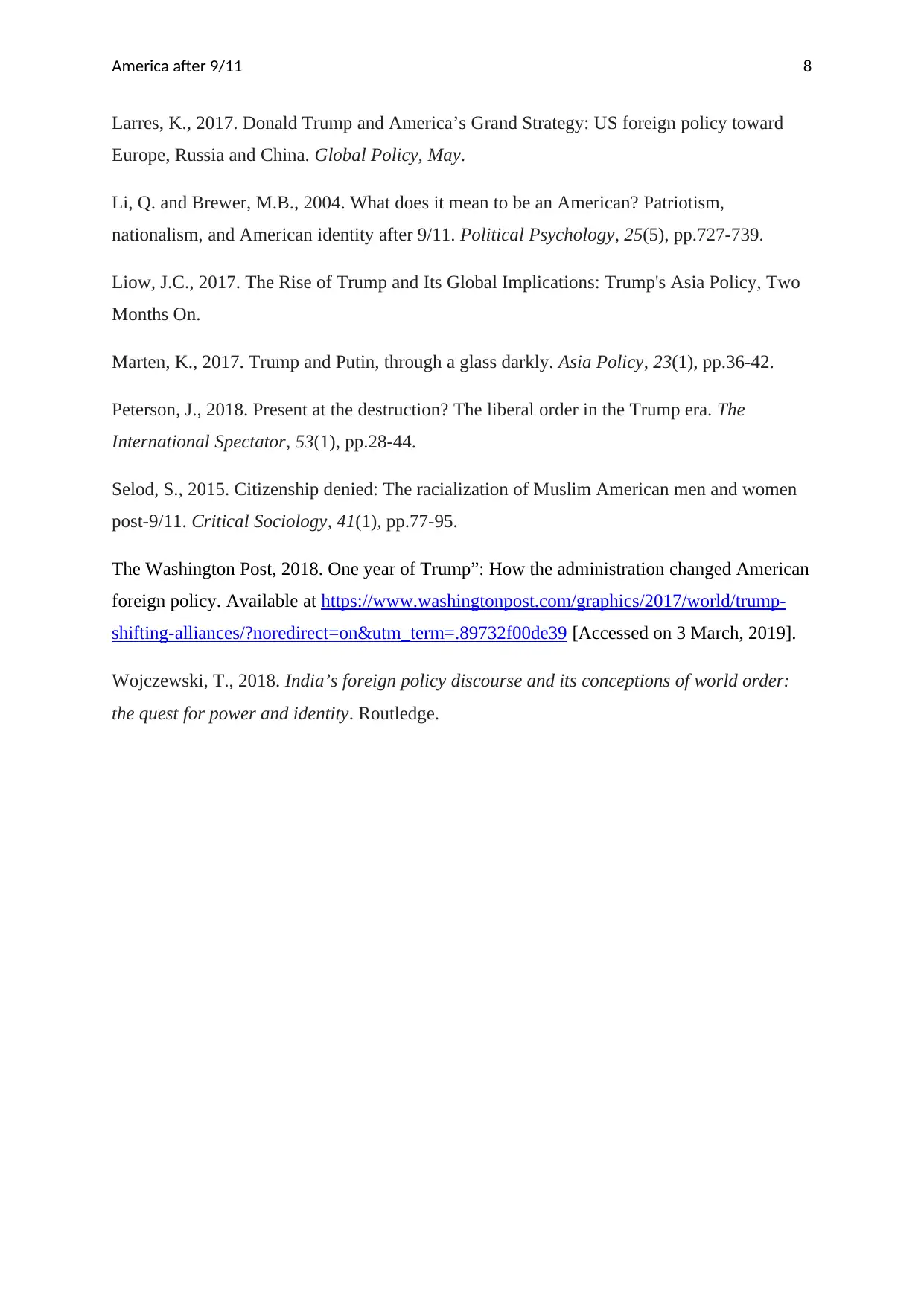
America after 9/11 8
Larres, K., 2017. Donald Trump and America’s Grand Strategy: US foreign policy toward
Europe, Russia and China. Global Policy, May.
Li, Q. and Brewer, M.B., 2004. What does it mean to be an American? Patriotism,
nationalism, and American identity after 9/11. Political Psychology, 25(5), pp.727-739.
Liow, J.C., 2017. The Rise of Trump and Its Global Implications: Trump's Asia Policy, Two
Months On.
Marten, K., 2017. Trump and Putin, through a glass darkly. Asia Policy, 23(1), pp.36-42.
Peterson, J., 2018. Present at the destruction? The liberal order in the Trump era. The
International Spectator, 53(1), pp.28-44.
Selod, S., 2015. Citizenship denied: The racialization of Muslim American men and women
post-9/11. Critical Sociology, 41(1), pp.77-95.
The Washington Post, 2018. One year of Trump”: How the administration changed American
foreign policy. Available at https://www.washingtonpost.com/graphics/2017/world/trump-
shifting-alliances/?noredirect=on&utm_term=.89732f00de39 [Accessed on 3 March, 2019].
Wojczewski, T., 2018. India’s foreign policy discourse and its conceptions of world order:
the quest for power and identity. Routledge.
Larres, K., 2017. Donald Trump and America’s Grand Strategy: US foreign policy toward
Europe, Russia and China. Global Policy, May.
Li, Q. and Brewer, M.B., 2004. What does it mean to be an American? Patriotism,
nationalism, and American identity after 9/11. Political Psychology, 25(5), pp.727-739.
Liow, J.C., 2017. The Rise of Trump and Its Global Implications: Trump's Asia Policy, Two
Months On.
Marten, K., 2017. Trump and Putin, through a glass darkly. Asia Policy, 23(1), pp.36-42.
Peterson, J., 2018. Present at the destruction? The liberal order in the Trump era. The
International Spectator, 53(1), pp.28-44.
Selod, S., 2015. Citizenship denied: The racialization of Muslim American men and women
post-9/11. Critical Sociology, 41(1), pp.77-95.
The Washington Post, 2018. One year of Trump”: How the administration changed American
foreign policy. Available at https://www.washingtonpost.com/graphics/2017/world/trump-
shifting-alliances/?noredirect=on&utm_term=.89732f00de39 [Accessed on 3 March, 2019].
Wojczewski, T., 2018. India’s foreign policy discourse and its conceptions of world order:
the quest for power and identity. Routledge.
1 out of 9
Related Documents
Your All-in-One AI-Powered Toolkit for Academic Success.
+13062052269
info@desklib.com
Available 24*7 on WhatsApp / Email
![[object Object]](/_next/static/media/star-bottom.7253800d.svg)
Unlock your academic potential
© 2024 | Zucol Services PVT LTD | All rights reserved.





